June 21- August 19, 2013
Field Report

Summer (verano) has set in and the days tend to be cooler and overcast with a nice breeze blowing through. When the sun comes out it’s still hot, but not like during winter (el invierno). This will likely be the typical weather pattern until late December. It’s been a busy summer so far with lots of volunteers and several visiting groups, which has been great and we’ve been accomplishing a lot on multiple fronts.
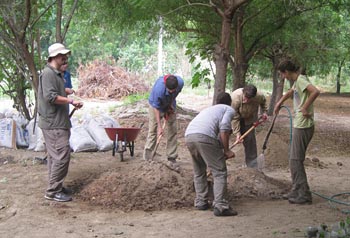

Revegetation project work has been divided between the greenhouse and watering at the three field sites that we planted earlier in the year (Universidad Católica, El Bosque en Medio de las Ruinas, and Bellavista). At the greenhouse, hundreds and hundreds of baby trees are growing until later in the year when they will be donated or planted in the field. Seedbeds of Caoba, Chirimoya, Pechiche, Guachepeli, Guayaba, Tierramonte, and Algarrobo are bursting with seedlings that need transplanting. This is where having large groups of visitors is crucial, since transplanting the trees is very labor intensive. Soil is mixed, bottles cut and filled with soil, and then each tree is carefully moved from the seedbed to its individual container.

Volunteers mix compost.
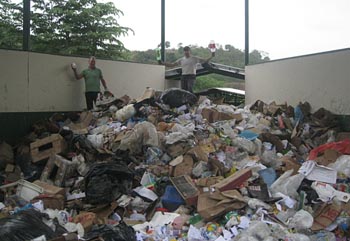
In late June, William and a group of four students from Sage Educators in California visited for a couple of weeks. While they were here we paid a visit to the Rio Muchacho Organic Farm and Ecological School. We delivered a batch of trees and had a revegetation workshop with the students and teachers at this alternative school. We planted trees at the school and on nearby properties. The students even took trees home to their houses to plant with their families as homework.
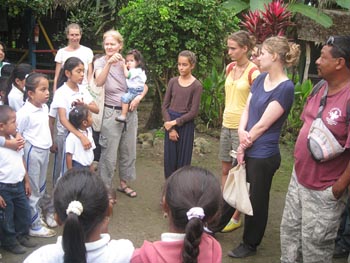

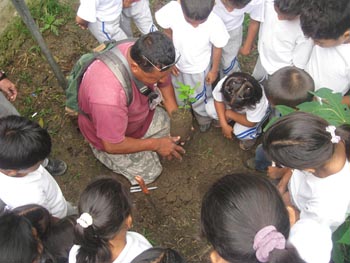
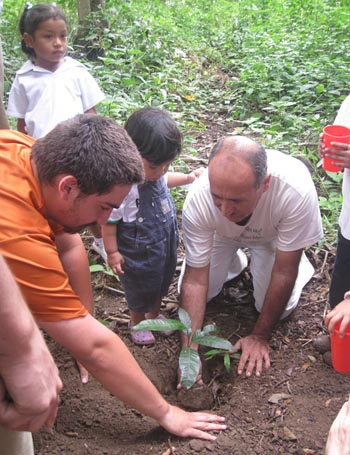
In early July, the Children of Ecuador Foundation from Spruce Grove in Alberta, Canada came to volunteer at a variety of projects in and around Bahia. Children of Ecuador has been a partner organization with Planet Drum since 2007 and this year they came with a group of twenty-plus volunteers. They spent several days over the course of two weeks working with Planet Drum. In addition to helping us water all three revegetation sites from 2013, they assisted in greenhouse tasks. In a single morning they transplanted 825 baby Caoba trees!
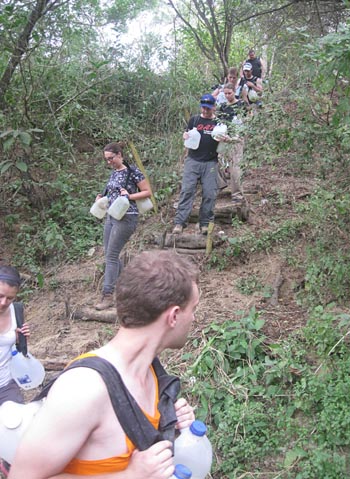


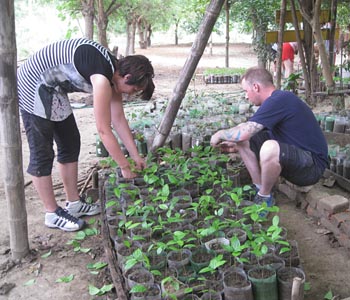
Their group brought passion and motivation to the work and we even took on a couple of social side-projects. The projects consisted of replacing and expanding the roof over the communal cob oven in Bellavista. Also, with guidance from Orlando, we decided to help one of the most disadvantaged families in Bellavista by completely rebuilding part of their house that was collapsing. An elderly couple lives in the house with their daughter and the mother is blind. The entire kitchen, one whole side of the house, was rotten and very dangerous. In an incredibly generous act, the Children of Ecuador Foundation provided the materials and much of the labor in order to replace a this huge portion of their house. Planet Drum, Bahía, and the residents of Bellavista extend their gratitude to the continued support from this pro-active foundation and we look forward to continuing to collaborate in the future!
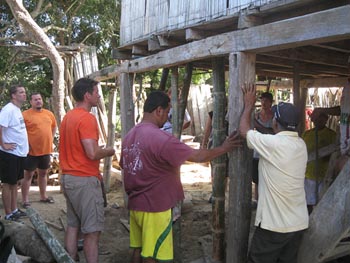
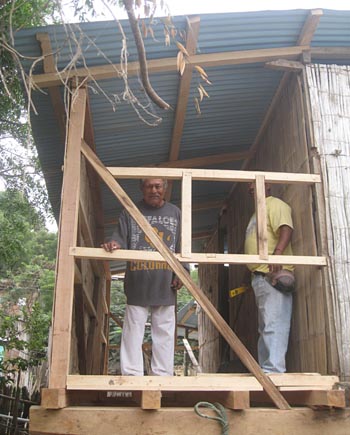
In other news, the Coorporación Nacional de Electricidad (CNEL) has partnered with Planet Drum to deliver one tree per $500 invested in electrical infrastructure by the Ecuadorian Government. This is an excellent opportunity for Planet Drum to impact the larger Dry Tropical Forest region since CNEL has been assisting with transporting and delivering our trees to communities outside of Bahía. Each community representative gets a batch of trees that they distribute to individual households, so each household receives one or two trees. We are working closely with CNEL and the communities to deliver trees that are the most sought after and will have the highest likelihood of being properly planted and cared for. Note: normally, trees are distributed closer to the rainy season, but we need to work with CNEL’s schedule in this case and since trees are being distributed to individual households, presumably, each house has enough water to be able to properly plant and water the trees they receive.
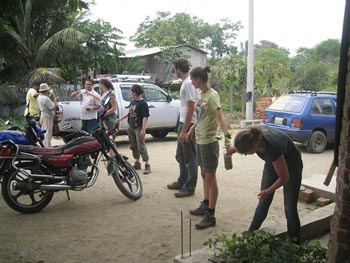
CNEL invited us to accompany them one day while delivering trees. We traveled with them to the Crucita area (45 minutes south of Bahía) to hand out trees to community leaders. While distributing trees we had an opportunity to talk directly with the recipients of the trees and discuss various ecological topics. We also gave them copies of the Revegetation Manual and offered pointers to planting and tending to the trees. All of the residents were very eager to receive trees and were pleased with the species, mostly native fruit producers, that we were distributing. The community president expressed interest in collaborating on a larger scale project in the future and we will remain in contact with her about this.


We held another Revegetation Workshop with students from the Montufar school at the greenhouse. A large group of students and two teachers came to the greenhouse to learn about the Planet Drum Revegetation Project and assist in transplanting seedlings. It was a fun and high intensity morning and the students were full of energy! At the end, many of them were asking when they could come back to help out more. Almost all of the students requested trees to take home and plant. We are planning to do more collaboration with the students, including tree donations, in the coming months.
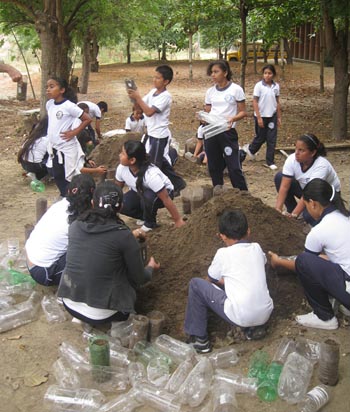

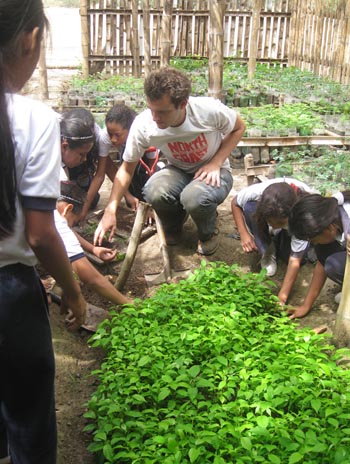
For the past three months, three interns have been working on a variety of side-projects to complement the Revegetation Project. Eric, a community engagement intern from the George Washington University graduate International Development program, has focused his work on investigating composting toilets and composed a guide to building and properly using and maintaining composting toilets in this climate. Orlando has a brand new composting toilet at his house and there are talks of a Peace Corps project that would build more in of them in the Bellavista community. Eric jumped on this opportunity to educate residents about the benefits of composting toilets. The 10-page guide has been completed and will soon be published on the Planet Drum website in addition to distributing hard copies to residents who have limited computer access.
Becky, a Masters candidate at American University School of International Affairs, has also been involved in a community engagement internship and is producing educational materials of her own. She has compiled a comprehensive introduction to Bioregionalism and has inspired us to do some research on alternatives to chemical pest controls. Sadly, conventional agriculture is the norm around Bahía and the province of Manabí. In Crucita, residents complained of excessive chemical usage and simultaneous insect plagues, suggesting improper and ineffective chemical usage. There is a huge potential for promoting organic pest controls and agricultural practices. Fortunately, there are many plants that grow wildly in the area that are effective at controlling insect pests, such as hot peppers and tobacco. Planet Drum is currently experimenting on the plants at the greenhouse with organic pesticide recipes and will be perfecting them to promote to the greater public.
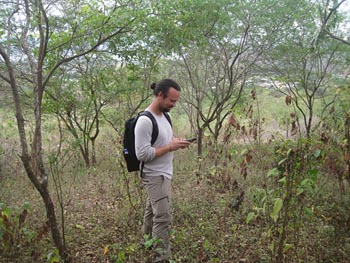
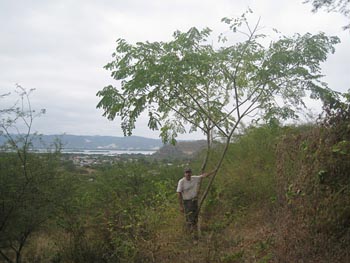
Joffrey, a professional in GIS and GPS mapping from France, visited Bahia with his family for over three months and has been assisting in a revegetation site mapping project. With his help we revisited all of the past planting sites from the past 10 years of Planet Drum work. We mapped 50 of them covering over 30 hectares of land! Joffrey also acquired GPS maps from the local Bahía city government offices and the Military Geographical Institute in Quito to provide satellite overlays to the maps. The map is a crucial stepping stone for researching future aspects of the Revegetation Project and studying the work that we have already done. It is also the first time that there has been a comprehensive visual representation of the years of work that we have done on revegetation and erosion control. An image of the map with be generated and published soon.
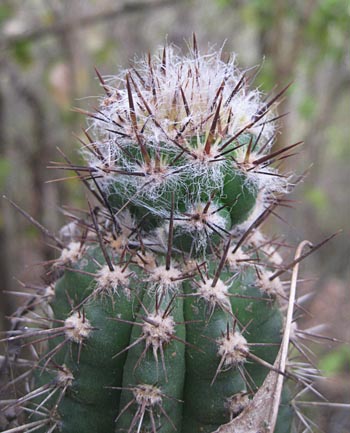
A solid group of volunteers, including a volunteer coordinator intern, are already signed up for the coming months, but there is always more work to do. We are accepting interns and volunteers on a rolling basis. If you are interested in helping with Planet Drum’s ecological work in Bahía de Caráquez, please contact me at planetdrumecuador@yahoo.com.
Pásalo bien,
Clay

Reader Interactions